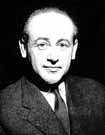
|
|
|

|

|

|

|
|
Click on an image to see a larger, more detailed picture.
|
|
|
|
|
| 1944: Desperate Acts |

|
pg. 515 |

|
|
|
|
| |
 Mobilized for all-out war, the Red Army utilized women--including these Polish members of the Kosciuszko Division--as combatants. By February 1944 Soviet forces had driven the Germans from portions of Poland, and continued their westward advance. But the drive to liberate Eastern Europe necessarily came in stages, over great periods of time. The justifiably triumphant smiles of these soldiers aside, countless prisoners of the Holocaust were still to die, and many Polish Jews who survived discovered that antisemitism had not been banished from their homeland.
Mobilized for all-out war, the Red Army utilized women--including these Polish members of the Kosciuszko Division--as combatants. By February 1944 Soviet forces had driven the Germans from portions of Poland, and continued their westward advance. But the drive to liberate Eastern Europe necessarily came in stages, over great periods of time. The justifiably triumphant smiles of these soldiers aside, countless prisoners of the Holocaust were still to die, and many Polish Jews who survived discovered that antisemitism had not been banished from their homeland.
Photo: Corbis-Bettmann
|
 At the Westerbork, Holland, camp, Jewish policemen carry an elderly woman to a train bound for Auschwitz. On February 10, 1944, a train containing approximately 1000 Westerbork inmates arrived at the death camp. Of that group, about 800 were gassed. The rest were put to work, their deaths merely postponed.
At the Westerbork, Holland, camp, Jewish policemen carry an elderly woman to a train bound for Auschwitz. On February 10, 1944, a train containing approximately 1000 Westerbork inmates arrived at the death camp. Of that group, about 800 were gassed. The rest were put to work, their deaths merely postponed.
Photo: Trudi Gidan/United States Holocaust Memorial Museum Photo Archive
|
 Paul Célan, born in Romania in 1920, composed haunting poetry about the Holocaust. During the Nazi occupation, his parents were deported to Transnistria, where his father died from typhus and his mother was shot. Célan spent 18 months in a labor camp. His experiences there and the deaths of his parents shaped his most famous poem, "Death Fugue." The poem evokes images of unceasing suffering, such as the words "black milk of daybreak we drink it at dusk."
Paul Célan, born in Romania in 1920, composed haunting poetry about the Holocaust. During the Nazi occupation, his parents were deported to Transnistria, where his father died from typhus and his mother was shot. Célan spent 18 months in a labor camp. His experiences there and the deaths of his parents shaped his most famous poem, "Death Fugue." The poem evokes images of unceasing suffering, such as the words "black milk of daybreak we drink it at dusk."
Photo: Ullstein Bilderdienst
|
|

|

|

|

|
 March 7, 1944: Poet David Vogel is deported from Drancy, France, to Auschwitz. Children on the same transport include 17-year-old Henriette Hess and her nine-year-old brother, Roger. Both are deported without their parents.
March 7, 1944: Poet David Vogel is deported from Drancy, France, to Auschwitz. Children on the same transport include 17-year-old Henriette Hess and her nine-year-old brother, Roger. Both are deported without their parents.
|
 March 7, 1944: 3800 Czech Jews are gassed at Auschwitz just days after a stage-managed camp tour for the benefit of a visiting Red Cross delegation, during which camp administrators offered assurances of inmate safety. During the gassing, those Jews who resist with bare hands are driven into the gas chamber with rifle butts and flamethrowers. They die singing the Czech national anthem and "Hatikvah," later the national anthem of Israel. Eleven pairs of twins are spared for "research" experiments by Dr. Josef Mengele.
March 7, 1944: 3800 Czech Jews are gassed at Auschwitz just days after a stage-managed camp tour for the benefit of a visiting Red Cross delegation, during which camp administrators offered assurances of inmate safety. During the gassing, those Jews who resist with bare hands are driven into the gas chamber with rifle butts and flamethrowers. They die singing the Czech national anthem and "Hatikvah," later the national anthem of Israel. Eleven pairs of twins are spared for "research" experiments by Dr. Josef Mengele.
|
 March 7, 1944: Fifteen hundred Jews are deported from Drancy, France, to Auschwitz.
March 7, 1944: Fifteen hundred Jews are deported from Drancy, France, to Auschwitz.
|
 March 7, 1944: Anne Frank observes that "he who has courage and faith will never perish in misery!"
March 7, 1944: Anne Frank observes that "he who has courage and faith will never perish in misery!"
|
|
|
|
|
| 1944: Desperate Acts |

|
pg. 515 |

|
|
The Holocaust Chronicle
© 2009 Publications International, Ltd.
|
|
